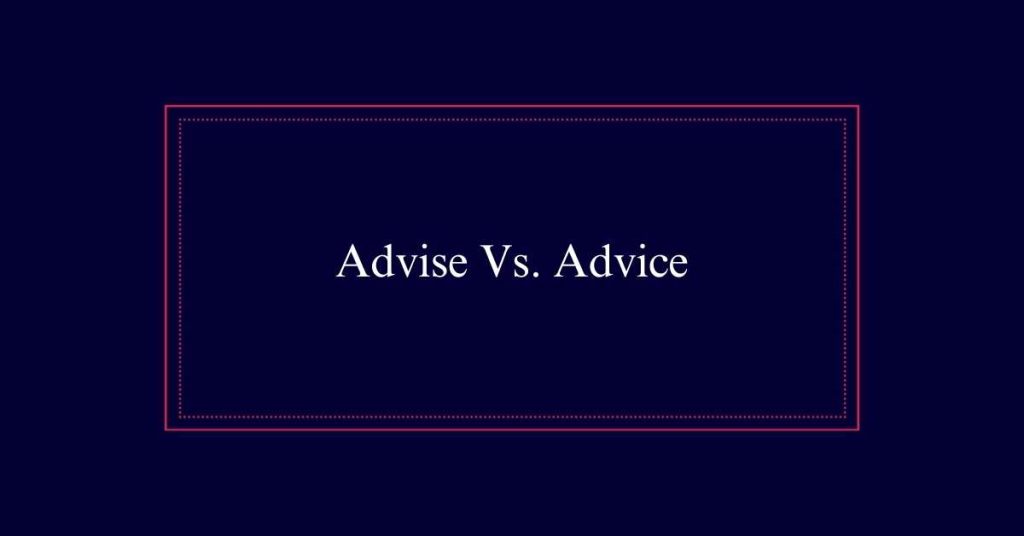Advise Vs. Advice
The words ‘advise’ and ‘advice’ are often confused but have distinct meanings. ‘Advise’ is a verb that means to suggest or recommend actions. It is important for clear communication. Meanwhile, ‘advice’ is a noun and refers to the suggestions or recommendations themselves. Using ‘advise’ and ‘advice’ correctly is essential for clear communication. Recognizing the verb and noun forms helps prevent common mistakes.
Definition of Advise
As a result, defining ‘advise’ involves understanding its role as a verb that means to suggest or recommend actions. It is used when someone offers guidance or recommendations. For instance, a lawyer might advise a client not to sign documents without reading them.
The verb ‘advise’ is pronounced with a ‘z’ sound and has synonyms such as suggest, counsel, and notify. When you advise someone, you are actively providing them with advice.
Advising is an action that requires communication of suggestions aimed at helping someone make informed decisions. As a result, advising is an essential function in various professional and personal contexts, ensuring that individuals receive the necessary guidance to navigate different situations effectively.
Definition of Advice
Advice refers to a recommendation or suggestion offered to guide someone’s actions or decisions. It is a noun and is essential in everyday interactions where guidance is sought. Advice can vary widely, from simple tips to detailed strategies.
Here are three key aspects of advice:
- Purpose: The main aim of advice is to help someone make a better decision or avoid a mistake. It provides clarity and direction.
- Context: Advice can be sought in various situations, such as personal life, professional settings, or financial matters.
- Source: Advice often comes from someone with more experience or knowledge in a particular area, lending it credibility and weight.

Verb Vs. Noun
Understanding the distinction between a verb and a noun is essential for proper usage in language. In the context of ‘advise’ and ‘advice,’ this difference is important.
‘Advise’ is a verb, meaning to suggest or recommend. For example, ‘I advise you to study regularly.’ It describes an action.
On the other hand, ‘advice’ is a noun, referring to the suggestion or recommendation itself. For instance, ‘She gave me excellent advice on career choices.’ It represents a thing or idea.
Pronunciation Differences
In addition to their grammatical roles, ‘advise’ and ‘advice’ differ in pronunciation. These differences are subtle but significant for clear communication.
- ‘Advise’: Pronounced with a ‘z’ sound, it rhymes with ‘wise.’ This pronunciation highlights its function as a verb.
Example: ‘I advise you to be cautious.
- ‘Advice’: Pronounced with an ‘s’ sound, it rhymes with ‘mice.’ This pronunciation indicates its role as a noun.
Example: ‘He gave me excellent advice.’
- Phonetic Distinction: The ‘s’ and ‘z’ sounds distinguish the two words in speech. This helps listeners understand whether a suggestion is being given (advise) or received (advice).
Usage in Sentences
Correctly using ‘advise’ and ‘advice’ in sentences can enhance both written and spoken communication. ‘Advise’ is a verb, meaning to suggest or recommend actions. For example: ‘The doctor advised him to rest.’
‘Advice’ is a noun, referring to the suggestions or recommendations given. For instance: ‘She gave me excellent advice on managing time.’
When constructing sentences, remember that ‘advise’ should be used when someone is offering a suggestion or recommendation. On the other hand, ‘advice’ is used when referring to the content of the suggestion or recommendation itself.
Accurate usage ensures clarity and professionalism in communication. For example: ‘I advise you to follow her advice on the project.’
Synonyms for Advise
Several synonyms for ‘advise’ can enhance your vocabulary and communication skills. Employing different terms can make your speech and writing more dynamic.
Here are three notable synonyms:
- Recommend: This word suggests offering a particular course of action. For example, ‘The consultant recommended increasing the budget.’
- Counsel: Often used in more formal settings, it implies providing guidance or advice. For example, ‘The mentor counseled her on career choices.
- Suggest: This is a more casual way to offer advice or ideas. For example, ‘He suggested taking a different route to avoid traffic.
Synonyms for Advice
When seeking synonyms for ‘advice,’ consider terms that convey guidance and recommendations. Words like ‘guidance’ and ‘counsel’ are often used interchangeably with ‘advice.’
‘Guidance’ emphasizes directing someone towards a particular course of action. ‘Counsel’ suggests a deeper, more formal level of advice, often given by professionals.
Another synonym is ‘recommendation,’ which implies suggesting a specific course of action. ‘Direction’ is also used, focusing on steering someone’s decisions. Each of these synonyms captures different nuances of offering advice.
Common Mistakes
A common mistake involves confusing ‘advise’ with ‘advice’ due to their similar spelling and pronunciation. This error can lead to misunderstandings in both written and spoken communication.
Here are three common mistakes to watch out for:
- Incorrect usage in sentences: People often use ‘advice’ when they mean ‘advise’ and vice versa. For example, saying ‘I advice you to study’ instead of ‘I advise you to study.’
- Pronunciation errors: Mispronouncing ‘advise’ with an ‘s’ sound instead of a ‘z’ sound can confuse listeners.
- Grammar issues: Using ‘advise’ as a noun or ‘advice’ as a verb disrupts sentence structure, making the message unclear. For instance, ‘He gave me a good advise’ should be ‘He gave me good advice.’
Practical Examples
Understanding the difference between ‘advise’ and ‘advice’ is essential, so let’s explore practical examples to clarify their correct usage.
When you say, ‘The doctor advised me to rest,’ ‘advise’ is the verb indicating the action of giving a recommendation.
Conversely, in ‘Her advice was invaluable,’ ‘advice’ is a noun referring to the recommendation itself.
Another example is, ‘He advised caution during the meeting,’ where ‘advise’ is again used as a verb.
In contrast, ‘I followed his advice and succeeded,’ showcases ‘advice’ as a noun.
Tips for Correct Usage
How can you guarantee you are using ‘advise’ and ‘advice’ correctly in your writing? Here are three tips to help you remember:
- Remember the Function: ‘Advise’ is a verb, meaning to suggest or recommend. If you are performing the action, use ‘advise’. For example, ‘I advise you to study.’
- Identify the Part of Speech: ‘Advice’ is a noun, referring to the suggestion or recommendation itself. Use ‘advice’ when talking about the information given. For example, ‘Her advice was invaluable.’
- Pronunciation Clues: Pronounce ‘advise’ with a ‘z’ sound and ‘advice’ with an ‘s’ sound. This can help you distinguish them when writing or speaking.







